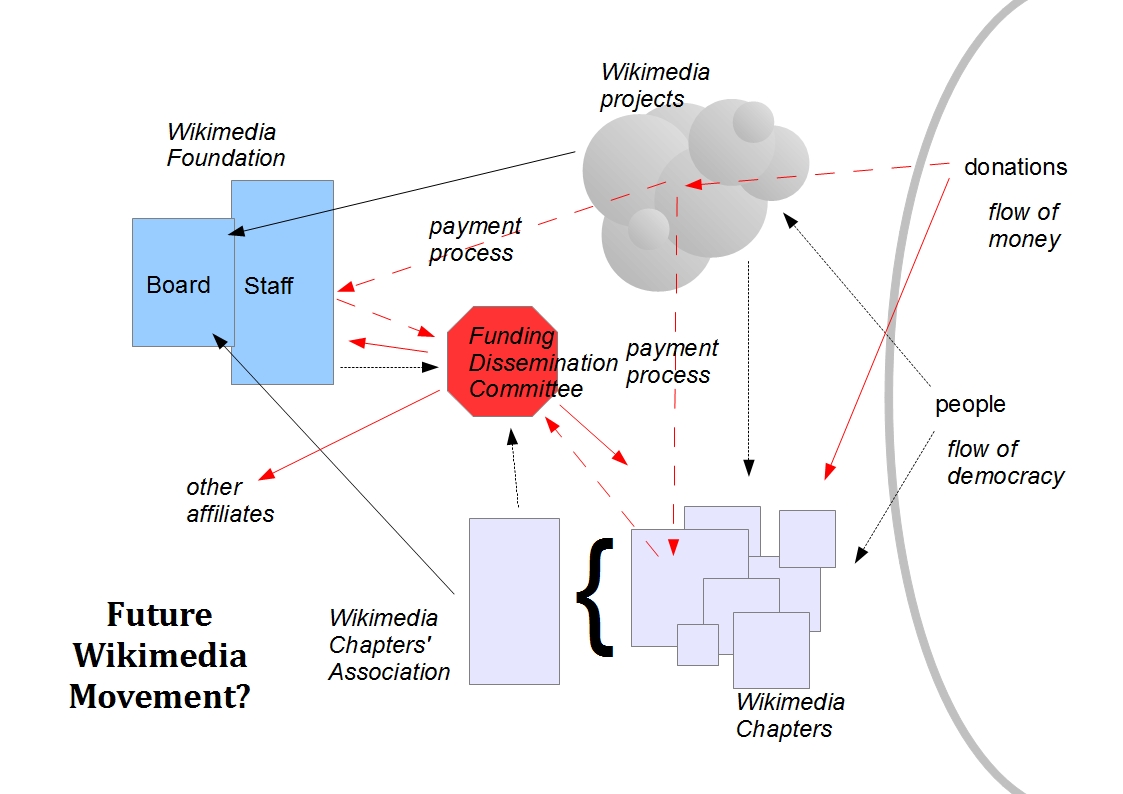Earlier this year, Wikimedia executive director Sue Gardner proposed to centralize fundraising activities and to move beyond geography-based chapter associations as the primary means of organizing (see “Redrawing the Borders of Wikimedia Governance: Turning the Money Screw“). Her move has inspired severe criticism and respective responses by prominent chapter organizations such as Germany, Italy and several chapters of Spanish-speaking countries. Specifically Wikimedia Germany, the largest chapter in terms of both members and fundraising, invested heavily in a detailed counterproposal entitled “Wikimedia’s culture of sharing: Remarks on common goals, localized fundraising and global action“.
A good impression of the intensity and the front lines of this debate is provided by the comments on a blog post by Wikimedia board member Stu West, where he explained “Why [he] supported the Board letter on fundraising“. The discussion thread also nicely illustrates the challenge of transnational governance, when West is accused of being US-centric:
There is a world outside the U.S. where people act according to different standards and think and decide differently. Our movement has to pay tribute to this fact.
After two months of discussion, Gardner has recently presented a revised version of her recommendations and asked the Foundation’s board to decide on it. The most controversial clause of her initial proposal is still part of her final list of recommendations:
Recommendation #3
To support a broader and more inclusive decision-making process for funds distribution, the Wikimedia Foundation will create a volunteer-driven body (working title: the Funds Dissemination Committee, or FDC) whose sole purpose will be to make recommendations to the Wikimedia Foundation for funding activities and initiatives in support of the mission goals of the Wikimedia movement. All funds raised via the Wikimedia project sites will be distributed via the recommendations of the FDC, with the exception of Wikimedia Foundation core operating costs and the operating reserve as described above.
With regard to fundraising, her recommendation is that “[a]ll donations received from visitors to Wikimedia project sites will be received and processed by the Wikimedia Foundation.” However, Gardner also leaves a door open by providing an “Alternate recommendation #3”, where it would be up to the executive director – currently herself – to decide “about whether chapters can payment-process Wikimedia project donations on a case-by-case basis”.
So, even in the case of the alternate recommendation, all fundraising activities would be centralized and fund dissemination would be delegated to a body that does not exist and whose composition and decision-making procedures are completely unknown, yet.
As of today, it is unclear how the Wikimedia Board will decide on the issue. In any case, we are observing the biggest showdown between the focal Wikimedia Foundation and the local Wikimedia chapter organizations so far.
Furthermore, we can observe another and probably unintended consequence of this showdown. Wikimedia chapter representatives pushed forward plans to establish a formal “Chapters Council/Association” comprising Wikimedia Chapters. While having been discussed for years, the recent open conflict obviously helped to close the ranks among chapters and provided motivation to actually implement the idea. The resulting meta-organization (Ahrne and Brunsson 2008) shall, according to the current proposal, not only function as an international counterpart to the Wikimedia Foundation representing chapter interests but also formalize the selection process for the two chapter-selected seats on the Foundation Board.
Ziko van Dijk, Wikipedian and member in the German and Dutch Wikimedia chapters, has visualized what the future Wikimedia governance structure could look like if both the “Funds Dissemination Committee” and the “Chapters Association” were to be established.
Looking at the overall process of (re-)negotiating Wikimedia governance, I find three observations particularly noteworthy. First, with the growing amount of funds raised, distribution conflicts have risen, too. While there is more money to be spent on Wikimedia activities than ever before, we can also see more fund-related conflicts than ever before.
Second, the whole conflict is fought out by representatives of the formal organizational bodies. The majority of Wikipedians – editors and administrators – seem to be rather uninterested in these governance issues.
Third, the case points to the importance of intellectual property rights for the distribution of power, even in open and collaborative projects such as Wikimedia. The reason why the Wikimedia Foundation has so much leverage is simply that the Foundation owns the Wikipedia trademark. And while the Creative Commons license of Wikipedia’s content would allow the community to fork and continue with the open encyclopedia outside of the foundation, this would only be possible under a different label. So even though all of Wikipedia’s content is provided by volunteers and all Wikimedia chapters are legally independent associations, the focal Wikimedia Foundation seems to hold the whip hand due to owning the Wikipedia trademark.
(leonhard)




4 comments
Comments feed for this article
March 16, 2012 at 14:12
Jon Awbrey
Serfs Up !!!
Maybe people are beginning to realize that Jimbo, Inc. is not some kind of Blow Against The Empire but just another microcosm of the Corporate Totalitarian Agenda —
But then, we are talking about Wikipediots here …
March 16, 2012 at 15:24
Jon Awbrey
Thanks for this report. Cited and discussed at the Wikipedia Forum —
Wikipedia Forum
March 17, 2012 at 01:13
Ariane Berthoin Antal
Useful summary of the current situation–and very interesting key observations re coindicence of more funding/more conflict; relative dis-interest of majority; trademark based whip.
April 4, 2012 at 21:31
Contours of Future Wikimedia Governance: More Centralized, More Diverse «
[…] encyclopedia Wikipedia, met in Berlin to decide on recommendations for restructuring (see “Wikimedia Governance: Showdown on the Board” and “Redrawing the Borders of Wikimedia Governance“). Three important things […]